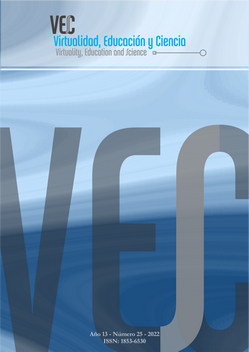Desarrollo y validación de un Framework para el análisis del trabajo colaborativo virtual
DOI:
https://doi.org/10.60020/1853-6530.v13.n25.37693Palabras clave:
colaboración; constructivismo; TIC; regulación; cooperaciónResumen
La inclusión de aspectos colaborativos, la mediación por tecnologías y la educación a distancia ha problematizado la noción del aprendizaje y, a su vez, ha generado nuevos interrogantes acerca de cómo estudiar este proceso. Debido a eso, nuestro trabajo desarrolla y valida un marco de referencia que colabore con el análisis de cuáles son las mejores variables que intervengan en el trabajo colaborativo a través de una computadora. El ámbito del Computer-Supported Collaborative Learning (aprendizaje colaborativo soportado por computadora) tiene una historia de debate acerca de sus teorías, sus métodos y su definición. A partir del marco teórico, desarrollamos una primera versión de nuestro framework, luego, lo sometimos al análisis de un jurado para armar una segunda versión y aplicarla a nuestro campo de estudio. Concluimos que las dimensiones que mejor visibilizan las acciones que facilitan o obstaculizan la colaboración en redes virtuales educativas son la agentividad, el conocimiento metacognitivo y el proceso de regulación de los aprendizajes.
Referencias
ARROW, H.; POOLE, M. S.; HENRY, K.B.; WHEELAN, S y MORELAND, R. (2004). Time, chanche, and development: the temporal perspective on groups. En: Small Group Research 35, pp 73-105. Doi: 10.1177/1046496403259757.
COLL, C. (2001). Constructivismo y educación: la concepción constructivista de la enseñanza y del aprendizaje. En: Desarrollo psicológico y educación. Psicología de la educación escolar. Madrid: Alianza, pp. 157-188.
DILLENBOURG, P. y JERMANN, P. (2007). Designing integrative scripts. En: Scripting Computer-Supported Collaborative Learning: Cognitive, Computational and Educational Perspectives. pp 275- 301. New York: Springer,
GARRISON, D. R. (2004). Student role adjustment in online communities of inquiry: model and instrument validation. En: Journal for Asynchronous Learning Networks 8, pp. 61–74.
HERNÁNDEZ SAMPIERI, R.; FERNÁNDEZ COLLADO, C. y BAPTISTA LUCIO, P. (2010). Metodología de la Investigación. México: McGraw Hill.
HURME, T.; PALONEN, T. y JÄRVELÄ, S. (2006). Metacognition in joint discussions: an analysis of the patterns of interaction and the metacognitive content on the networked discussions in mathematics. En: Metacognition Learning 1, pp. 181-200.
JÄRVELÄ, S. y HADWIN, A. (2013). New Frontiers: Regulating Learning in CSCL. En: Educational Psychologist 48(1), pp. 25-39.
KIRSCHNER, P.; KREIJNS, K.; PHIELIX, C. y FRANSEN, J. (2015). Awareness of cognitive and social behaviour in a CSCL environment. En: Journal of Computer Assisted Learning 31(1), pp. 59–77.
KOLLAR, I.; FISCHER, F. y HESSE, F. (2006). Collaboration Scripts; A Conceptual Analysis. En: Educational Psychology Review 18(2), pp. 159-185. Berlín: Springer Verlag.
KOSCHMANN, T. (1996). Paradigm shifts and instructional technology. En: CSCL: Theory and practice of an emerging paradigm, pp. 1-23. New Jersey: Lawrence Erlbaum.
MALMBERG, J.; JÄRVELÄ, S.; JÄRVENOJA, H.; PANADERO, E. (2015). Promoting socially shared regulation of learning in CSCL: Progress of socially shared regulation among high- and low-performing groups. En: Computers in Human Behavior 52, pp. 562–572.
MILLER, M. y HADWIN, A. (2012). Social aspects of regulation: Measuring socially-shared regulation in collaborative contexts. Paper presented at the annual meeting of the American Educational Research Association, Vancouver, British Columbia, Canada
REMESAL, A. y COLOMINA, R. (2013). Social presence and online collaborative small group work: a socioconstructivist account. En: Computers & Education 60, pp. 357–367.
ROMERO, M. y LAMBROPOULOS, N. (2011). Internal and External Regulation to Support Knowledge Construction and Convergence in Computer Supported Collaborative Learning (CSCL). En: Electronic Journal of Research in Educational Psychology 9(1), pp. 309-330.
SCHRAW, G. y DENNISON, S. (1994). Assessing metacognitive awareness. En: Contemporary Educational Psychology 19, pp. 460-475.
STAHL, G. (2006). Group cognition: Computer support for building collaborative knowledge. Cambridge: MIT Press.
STAHL, G.; KOSCHMANN, T. y SUTHERS, D. (2006). Computer-supported collaborative learning: An historical perspective. En: Cambridge handbook of the learning sciences, pp. 409-426. Cambridge Cambridge University Press.
SCHUNK, D. H. y ZIMMERMAN, B. (Eds.). (2008): Motivation and self-regulated learning: theory, research, and applications. NewYork: Erlbaum.
VOLET, S.; SUMMERS, M. y THURMAN, J. (2009) High-level co-regulation in collaborative learning: How does it emerge and how is it sustained? En: Learning and Instruction 19, pp. 128-143. Leuven: European Association for Research on Learning and Instruction.
VYGOTSKY, L. (1993). Pensamiento y lenguaje. Buenos Aires: Ediciones Fausto.
WEINBERGER, A. y FISCHER, F. (2006). A framework to analyze argumentative knowledge construction in computer-supported collaborative learning. En: Computers & Education 46, pp. 71–95.
WHITE, C. (1999). The Metacognitive Knowledge of Distance Learners. En: Open Learning: The Journal of Open and Distance Learning
ZIMMERMAN, B. y RISEMBERG, R. (1997). Becoming a Self-Regulated Writer: A Social Cognitive Perspective. En: Contemporary Educational Psychology 22(1), pp. 73-101.
Publicado
Número
Sección
Licencia

Esta obra está bajo una licencia internacional Creative Commons Atribución-NoComercial 4.0.
Se permite la generación de obras derivadas siempre que no se haga con fines comerciales. Tampoco se puede utilizar la obra original con fines comerciales.


